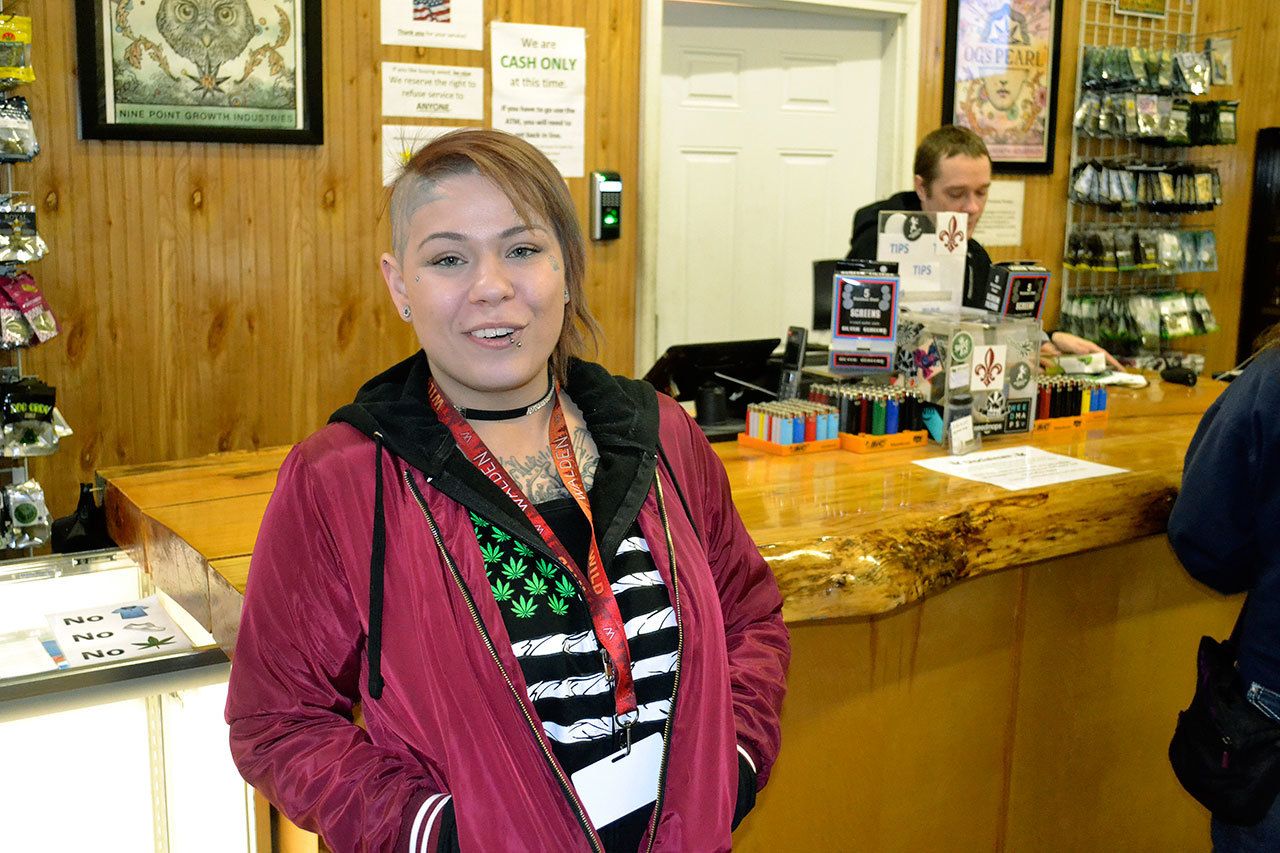Auburn’s first retail marijuana store is ready for a growth spurt.
That is, after The Stashbox acquires the permits to make it happen, it’s gonna huff, and it’s gonna puff, and it’s gonna blow down its south walls to nearly double in size.
“We’ve gotten too big for our space,” said Nikki Marangon, 27, manager of The Stash Box, at 3108 A St. SE in Auburn, and a junior buyer for the store. “All the good stuff that’s coming in isn’t slowing down, so we need more room to stay competitive, especially in concentrates, where our sales are really up.”
Here’s what’s going on.
In its 26 months, The Stashbox has brought in $10.8 million in gross revenue. Or, to rephrase that, last week the store did $69,156 in tax alone from cannabis sales, $14,276 of it going to the City of Auburn and the rest to the state of Washington. It earned most of its total money in 2016, Marangon said. In December, the store generated $250,643 in excise tax alone.
As a whole, the industry in Washington has generated more than $400 million in excise tax since voters approved I-502 in November 2012.
According to i502data.com, which tracks all of the sales and taxes collected from Cannabis retailers, last month, the store moved into 13th place for total marijuana retail sales in the state.
“Not bad at all,” Marangon said with a smile. “I don’t think there’s many more businesses giving $14,000 a week directly back to the City of Auburn.”
All of this comes as a surprise to the store’s owner and chief executive officer, James Blankenship.
“When we first opened, I expected the store to constantly have a line out the door, but that wasn’t the case,” Blankenship said in an e-mail. “Between the black and medical markets, we had to depend a lot on the elderly and retired to make it through our first year. Since then, many changes to the law have taken place which have helped drive down the cost of cannabis, which in turn has added a much wider range of demographics to our overall customer base. In short, I always had high hopes for The Stash Box; I knew we would have customers but never anticipated the volume increase we would see in just the past year.”
Must be doing something right.
Well, Marangon explained, where many other retail marijuana stores tailor their business to high-end boutique sales, The Stash Box is a source for blue-collar folks, known for making its 90 different strains of smokeables as well as ingestables and what-have-you-ables accessible to as many people as possible.
“As a business in general, you kind of have to go with the flow of the industry, of course, but we do pride ourselves on getting really good prices, and working hard on passing that along as opposed to just upping our margins,” Marangon said.
About 5 feet, 4 inches tall, Marangon has worked at the Auburn store for about a year and a half is a sharp-minded business woman with a unique sense of self-decoration. Above her left eye, in cursive Russian, she sports the word “Batman,” and below it, a tattooed paw print. She’s got a tattoo on every finger.
In her previous gig, she managed a bar on Seattle’s Capitol Hill.
She loves her job.
“Part of what makes my job so enjoyable is all the sales reps who come in and say, ‘Hey, here’s our weed, try it, and if you like it, buy it,’ ” Marangon said with a laugh.
Like many others in her line of work, however, Marangon – her nickname is “Smokahontas” – wouldn’t complain should the government ease up on its prodigious taxing and regulating of the cannabis industry.
Yet, even in high taxes, the upbeat Marangon can find that diamond in the manure pile.
“Gouge is a bit of a strong word, but it would be nice not to have our demographic so highly taxed. Yet in that same vein, a lot of the 502 taxes are going toward education. It’s going toward helping the community,” Marangon said.
Theirs is a unique customer service, Marangon says.
“In so many other states and so many other areas of the country, we’d be under federal trouble; we’d be directly violating the law. But Washington state voters have provided this opportunity to show exactly what this industry can do,” Marangon said.
Quoting from a recent article in the Washington Post that compared the cannabis industry to the NFL, she said by 2020 word is the marijuana market may triple the size of the pro football kingpin in revenues.
“And on top of that, it can be taxed and regulated. We can be giving back more to the community because of this amazing product, and we are seeing more and more possibilities of what can be done,” Marangon said.



